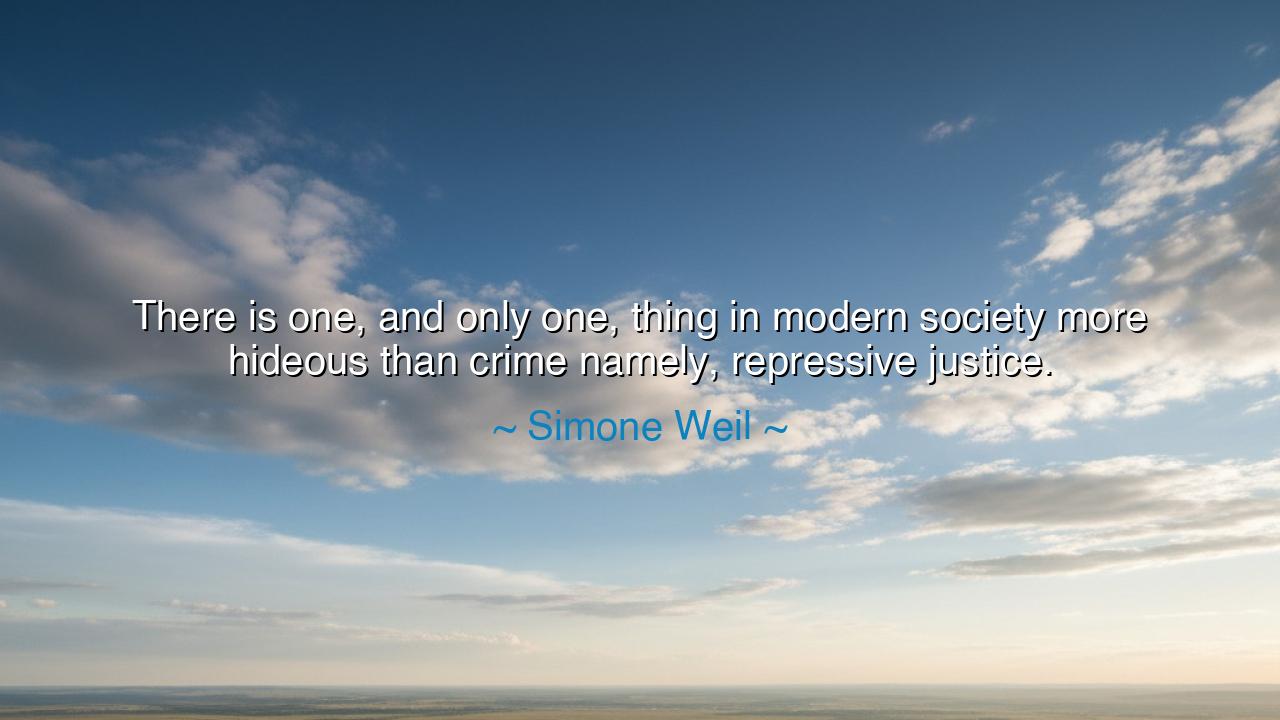
There is one, and only one, thing in modern society more hideous
There is one, and only one, thing in modern society more hideous than crime namely, repressive justice.






Hear the fierce and sorrowful voice of Simone Weil, who declared: “There is one, and only one, thing in modern society more hideous than crime—namely, repressive justice.” These words are like a sword drawn against the false guardians of order, those who would claim to protect society but in truth suffocate it. They remind us that while crime wounds the body of the people, repressive justice poisons its very soul. For when the law, which ought to shield the innocent, becomes the tool of tyranny, it no longer punishes evil—it multiplies it.
What is crime? It is the theft, the violence, the betrayal committed by one against another. It is grievous, yes, but it is limited to the actions of individuals or small groups. What, then, is repressive justice? It is the system that cloaks cruelty in legality, that imprisons the weak for the convenience of the strong, that silences truth-tellers and calls it order. When such a system reigns, the evil of one man’s crime is magnified by the power of the state, spreading suffering across thousands, even millions.
History speaks with sorrowful clarity. In the days of the French Revolution, men rose to overthrow tyranny in the name of liberty. Yet in the Reign of Terror, the new rulers declared their own justice—swift, merciless, repressive. Thousands were sent to the guillotine, often without fair trial, their only crime being suspicion or dissent. Here, justice became more hideous than the crimes it claimed to avenge. The people, once seeking freedom, found themselves bound in chains forged from fear.
Or look to the twentieth century, when regimes across the world cloaked their brutality in the language of law. In the Soviet gulags, in Nazi courts, in authoritarian prisons, men and women were condemned not for crime, but for thought, for faith, for speaking truth. The punishment was wrapped in the garments of legality, but it was nothing more than repression. Such justice is worse than lawlessness, for it deceives the people into believing oppression is righteousness, and chains are safety.
The wisdom of Simone Weil lies in her unflinching clarity: crime can be confronted, healed, and punished justly—but repressive justice is rot at the core of the system itself. It transforms the guardian into the oppressor, the healer into the executioner. When society tolerates this, it ceases to be a fellowship of citizens and becomes a prison of subjects. Thus, the most hideous danger of all is not that men commit crime, but that entire nations lose their freedom under the banner of false justice.
The lesson for us is grave: we must guard not only against crime, but against the corruption of the very laws that claim to defend us. We must never allow fear to make us embrace repressive justice, for in seeking safety we may destroy freedom. True justice is patient, measured, merciful; it punishes wrongdoing without silencing the innocent. But when justice becomes vengeance, or when it serves power rather than truth, it becomes more monstrous than the crime it punishes.
Therefore, O listener, let your actions be these: question always the laws that bind you, and ask whether they preserve dignity or destroy it. Defend the rights of the accused, for in their trial lies the fate of your own freedom. When rulers call for harsher measures, examine their motives, lest repressive justice become the mask of tyranny. And in your own life, act with fairness and mercy, so that you embody the justice that heals rather than the false justice that enslaves. For Simone Weil’s voice still cries out across the ages: beware, for the darkest evil is not in the lawless, but in the law corrupted.






AAdministratorAdministrator
Welcome, honored guests. Please leave a comment, we will respond soon